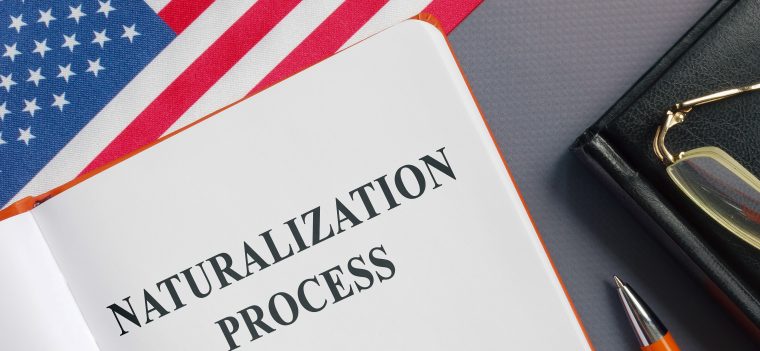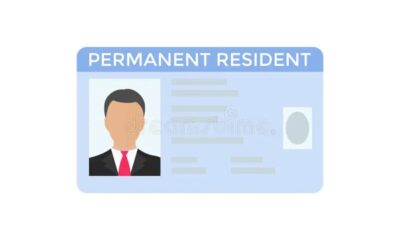Visa
Guide To Having A US Citizenship Through Naturalization

You can live in the United States if you are a Legal Permanent Resident (LPR) and have a Green Card. The downsides are that you will have to renew your Green Card and travel with a foreign passport. Once you are eligible, the next best step is to become a US citizen.
This page will go over the US naturalization application process, how long it takes, how much it costs, and other relevant information.
What are the Requirements to Become a Naturalized US Citizen?
If you are living in the US with a Green Card and want to become a citizen, then there are specific US citizenship requirements.
To become a US citizen through naturalization you must fulfill the following requirements:
- Be at least 18 years old when you file the application.
- Be a Green Card holder for at least 5 years.
- Have continuous residence in the US for at least 5 years before you file the application.
- You must have lived physically in the US for at least 30 months from the 5 years that you have had the Green Card.
- Prove that you have lived in the state you are applying for at least 3 months.
- Be able to speak, read, and write basic English.
- Understand US history and government.
- Show that you respect the US Constitution.
- Be a person of good moral character, which means you have not committed any serious crimes.
If you do not meet any of these qualifications for citizenship, you will be denied. US Citizenship and Immigration Services (USCIS) must process applications. Even if you apply without completing the qualifications for American citizenship, USCIS will decline your application.
How to Apply for US Citizenship Through Naturalization?
Make sure you’re not a citizen before applying for US citizenship through naturalization. Those born in the US or to US parents overseas may not need to seek for citizenship. Only Form N-600, Application for Certificate of Citizenship, or N-600K, Application for Citizenship and Issuance of Certificate, is required if your parent is a US citizen.
The following simple steps grant US citizenship through naturalization:
- Complete and submit Form N-400, Application for Naturalization.
- Give your biometric information.
- Complete the citizenship by naturalization interview.
- Complete the English language test.
- Complete the civics test.
- Receive the decision of USCIS.
- Take the Oath of Allegiance.
Complete and submit Form N-400, Application for Naturalization
This is your main naturalization or citizenship form. The USCIS website has it. You can complete and sign the form following its directions. If you live outside the US, include two passport-style pictures.
Check the directions to see whether you need to attach extra documents. These may include medical certifications, disability or developmental impairment documentation, and other citizenship documents. If you don’t attach the required documents, USCIS will request them after submission. This will unnecessary slow processing.
Attach proof of fee payment before applying. Without fees, your application is denied. Finally, save your interview application.
Give your biometric information
In case USCIS wants to do a background check on you, they might ask you to give biometric information. USCIS will send you a notification with your appointment time, date, and location. You must show up at the appointment. There, you will give your fingerprints and they will take a photograph of you.
Complete the citizenship by naturalization interview
USCIS will schedule an interview with you after completing your application. It is important that you do not miss this interview, therefore if you are unable to attend, please notify them so that they can reschedule. Rescheduling the interview will add a few months to the process of obtaining citizenship.
A USCIS officer will question you about your application and history during the interview. You must respond honestly and accurately.
Complete the English language test
Then there will be an English exam with three sections: speaking, reading, and writing.
Your communication skills will be evaluated by the USCIS officer. The officer will give you three phrases to read aloud during the reading test. You can find some sample sentences here.
You must write three sentences for the writing test, which you can rehearse using this paper. The reading and writing tests will cover a variety of historical and civic issues.
Complete the civics test
Following the English exam, you will take the civics exam. This examination focuses on the history and values of the United States. The officer will ask you ten questions, and you must correctly answer six of them. This PDF contains approximately 100 practice questions.
If you fail any of these tests the first time, you can retake them 60 to 90 days later. If you fail any of them for the second time, you must restart your application.
Receive decision of USCIS
USCIS will decide after processing the application and interview. The notice will either approve or deny the citizenship application.
If denied, they will explain why you cannot become a citizen. Appeal the judgement if you disagree. Form N-336, Request for a Hearing on a Naturalization Decision, is required for appeals. Filing the document within 30 days of the USCIS ruling ends your appeal.
If USCIS accepts your application, continue.
Take the Oath of Allegiance
Without the Oath of Allegiance, US citizenship is impossible. It may be possible to finish it on the same day of your interview, but USCIS will notify you. Attending the ceremony when USCIS arranges it is great, but you must contact them if you cannot. File Form N-445, Notice of Naturalization Oath Ceremony. Write a letter explaining your inability to attend the wedding. USCIS will evaluate and reschedule the ceremony.
Judges are the only ones who can administer the oath. Complete it to acquire the Naturalization Certificate. This certification makes you a US citizen and requires you to return your Green Card.
Do I Have to Take the English Language Test?
USCIS may waive the English test in certain instances. Those 50 or older who have been permanent residents for 20 years can skip the test (the 50/20 rule). The 55/15 rule exempts anyone 55 or older who have been permanent residents for 15 years.
You must take the civics test despite them. USCIS will only exempt you from the civics test if you are 65 or older and a permanent resident for 20 years.
Why Become a US Citizen?
US citizens were born in the US or became citizens after meeting the conditions. US citizens can travel to most countries using their passports. You can legally live and work anywhere in the US and earn an income. Property and driver’s license are yours.
Your foreign spouse can apply for a Green Card. Before or after filing for a Green Card, you must have a medical exam. After a few years, the spouse can become citizen. Your children born in the US are automatically citizens.
You can express yourself, practice any religion, and receive a fair trial as a US citizen. You can vote and run for office.
These privileges come with obligations. Respect the US constitution, pay taxes, and follow federal, state, and local laws. You must also serve on a trial jury and in the military if called.
How Long Does it Take to Become a US Citizen?
It takes around 6 months to become a US citizen from the time you submit your application. However, since there are so many steps to complete to become a US citizen, the US citizenship processing time can be quite long. That is why, it is important to start the process as soon as you are eligible.
How Much Does it Cost to Become a US Citizen?
It costs $725 to become a US citizen. There are two main fees which you must pay when you apply for US citizenship. One fee is the citizenship application fee of $640 and the other is the biometric services fee of $85.
What if I cannot afford to pay the fees?
Although this charge is high, USCIS permits applicants to pay by credit card. Fill out Form G-1450, Authorization for Credit Card Transaction. Military and 75-year-old applicants are excluded from biometrics expenses.
You can request a waiver from USCIS if you cannot afford the cost. Explain why you cannot afford Form I-912, Request for Fee Waiver, with your citizenship application. Medicaid recipients are more likely to be exempt.
What is the Difference Between a US Citizen and a US National?
Though to many it may sound as the same thing, they actually differ from each other. The main thing one should know before starting to spot the differences between both is that:
All US citizens are automatically US nationals, but not all US nationals are automatically US citizens.
Outside the US, the difference between a US national and a US citizen may seem insignificant or even invisible. For US citizens, this status is crucial to their daily lives because rights and duties depend on it.
It sounds cliche to many. No, it is not. Remember that US citizens are US nationals. Which means you must be a US national before becoming a citizen.
US citizenship is not automatically granted by nationality. Below are the definitions and traits of both to help you understand how they differ and why knowing your status is crucial.
What is a US citizen?
Usually a US citizen is considered an individual:
- Who was born in the United States.
- Who was born in Puerto Rico
- Who was born in Guam
- Who was born in the US. Virgin Islands
- Who was born in the Northern Mariana Islands
- Whose parent is a US. citizen.
- Who has been naturalized as a US citizen
Privileges of being a US Citizen in addition to US nationality privileges
- The right to vote in elections, and
- Voting representation in Congress
What is a US National?
According to the Immigration and Nationality Act, a US national is a person born to a parent of “outlying possessions of the United States,” which territories include American Samoa and Swains Island.
Privileges of US nationals
A US national has the following privileges:
- Consular protection of the US when abroad
- Possession of US documentations (i.e. US passports)
- The right to reside and work in the US
- The right to apply for US citizenship by naturalization after three months of residency in the US under the same rules as a permanent resident
Do US Nationals have restrictions in comparison to US citizens?
US nationals also have restrictions due to absence of citizenship as:
- Not entitled to voting representation in Congress
- Not entitled to vote in Federal, state, or local elections (except in their place of birth) and though non-citizen US nationals can
- vote to send a delegate to the congress, that individual is a non-voting delegate
After Becoming a US Citizen – Applying for the US Passport
The US passport application process is not as complicated as you may think. Only follow the steps below in order to correctly file your US passport application:
Fulfill the correct form
There are three different forms, one of which you will have to fulfill in order to start your US passport application.
- Form DS-11. This form should be completed by first-time applicants, children under 16, applicants from 16 to 17, and anyone not eligible for from DS-82.
- Form DS-82. This form should be completed by adults renewing their passports.
- Form DS-5504. This form should be completed by applicants wishing to change their name within a year, correcting a passport error or replacing a limited validity passport.
Collect your supporting documents
The second step is collecting the required documents, which are:
- An original or certified copy of citizenship evidence and a photocopy of it.
- A government-issued photo identification document (ID), and a photocopy of it.
- 2″ by 2″ color passport photo
- Requirements for children under 16:
- US birth certificate (also evidence of US citizenship)
- Parental Consent
- Parent’s Divorce/Custody decree (if applicable)
- Parent’s ID
- One photo
Pay the US passport fee
Passport fees vary depending on several aspects, including the applicant’s age, the reason for applying (first-time application, correction, renewal, etc.), and the additional services.






















